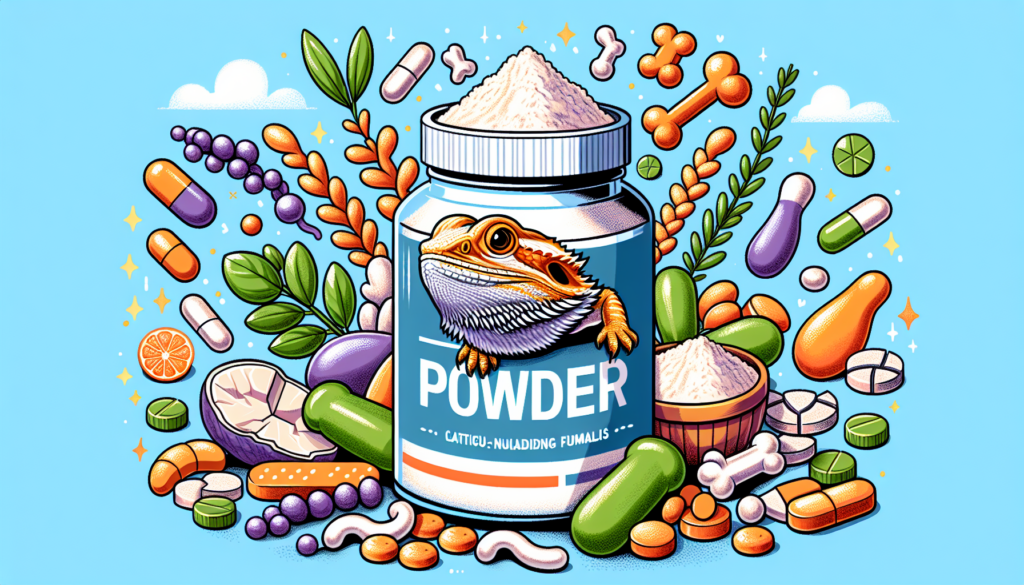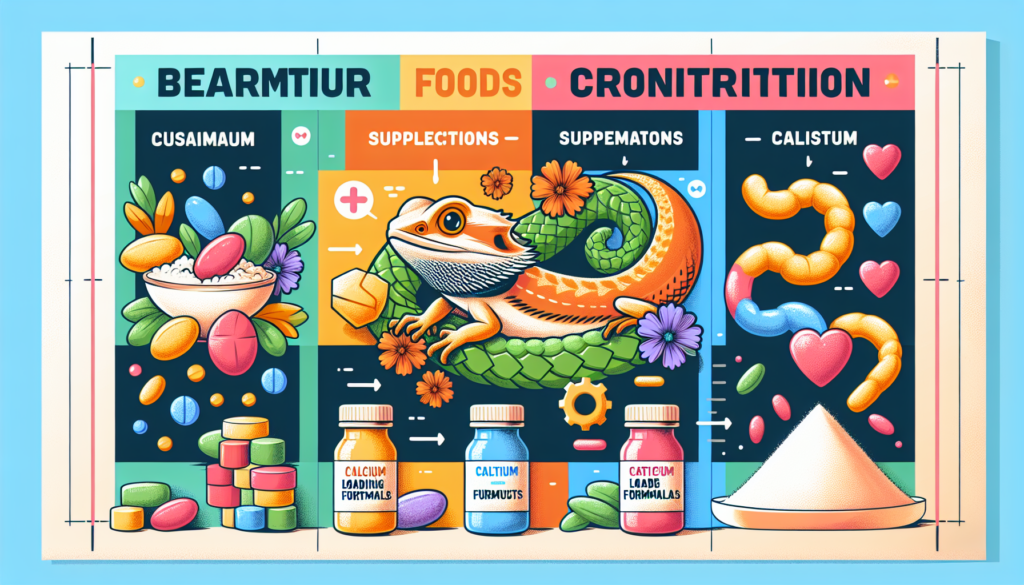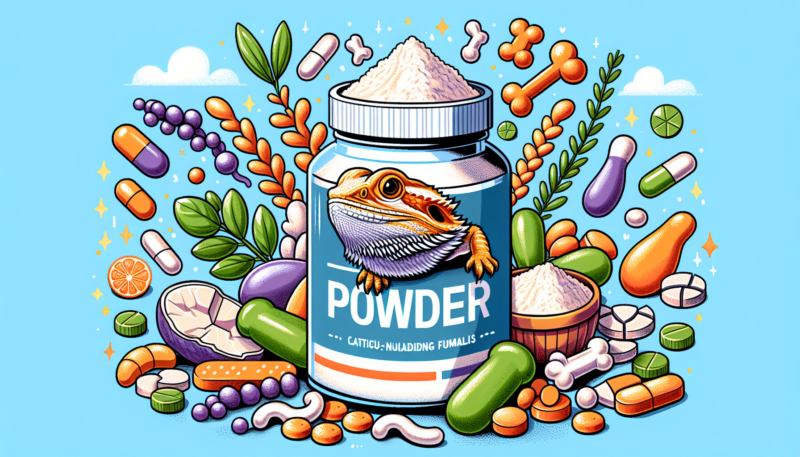If you are a proud owner of a bearded dragon, ensuring they have a nutritious and balanced diet is crucial for their overall health and well-being. That’s why the Bearded Dragon Food Powder is an excellent addition to their diet. Designed specifically for bearded dragons, this specially formulated powder is packed with essential vitamins, minerals, and nutrients to support their growth and development. Whether you are a seasoned reptile enthusiast or a new bearded dragon owner, this article will provide valuable insights into the benefits of incorporating this food powder into your pet’s daily diet.

Benefits of Bearded Dragon Food Powder
Nutritional Value
Bearded dragon food powder is specially formulated to provide the essential nutrients that these reptiles need to thrive. It is often fortified with vitamins, minerals, and calcium, which are crucial for their growth and overall health. The balanced nutritional profile of the food powder ensures that your bearded dragon is getting everything it needs to maintain optimal health.
Convenience
One of the significant advantages of using bearded dragon food powder is its convenience. It eliminates the need to hunt for live insects or prepare fresh vegetables and fruits for every meal. With food powder, you can simply mix it with water according to the instructions and offer it to your bearded dragon. This convenience is especially useful for those with busy schedules or limited access to fresh food sources.
Variety of Ingredients
Bearded dragon food powder usually contains a blend of high-quality ingredients that mimic the natural diet of these reptiles. This variety ensures that your bearded dragon receives a diverse range of nutrients, promoting overall well-being. The ingredients often include ground insects, vegetables, fruits, and other plant-based components. The assortment of ingredients also helps to keep your bearded dragon interested in its food, leading to better appetite and enjoyment during feeding time.
Choosing the Right Bearded Dragon Food Powder
Identifying Nutritional Requirements
Before selecting a bearded dragon food powder, it is essential to understand the nutritional requirements of these reptiles. Bearded dragons require a diet high in protein, calcium, and vitamin D3. Look for food powders that are specifically formulated to meet these requirements and provide a balanced diet for your pet.
Researching Brands
There are numerous brands of bearded dragon food powder available on the market. Take the time to research and read reviews about the different brands to ensure you choose a reputable and reliable product. Look for brands with a good reputation for producing high-quality and nutrient-rich food powders.
Reading Ingredients List
When selecting a bearded dragon food powder, pay attention to the ingredients list on the packaging. Make sure the powder contains a combination of protein sources, vegetables, fruits, and other essential nutrients. Avoid food powders that contain artificial additives, preservatives, or fillers, as these can be harmful to your pet’s health.
Preparing Bearded Dragon Food Powder
Instructions for Mixing
Each brand of bearded dragon food powder may have specific instructions for mixing. Follow the instructions provided carefully to achieve the correct consistency and ensure your pet’s food is properly prepared. Usually, you will need to mix the powder with water to create a paste or slurry-like consistency.
Storage Tips
To maintain the freshness and quality of the food powder, it is crucial to store it correctly. Most food powders come in resealable containers, which should be tightly sealed after each use to prevent moisture and air exposure. Store the powder in a cool and dry place, away from direct sunlight.
Avoiding Contamination
When handling bearded dragon food powder, it is important to practice good hygiene to avoid contamination. Wash your hands thoroughly before and after handling the powder to prevent the transfer of bacteria or other harmful substances. Additionally, use clean utensils and containers when mixing the food powder to ensure the safety and health of your bearded dragon.
Feeding Bearded Dragons with Food Powder
Portion Control
Proper portion control is essential when feeding bearded dragons with food powder. Overfeeding can lead to obesity and other health issues, while underfeeding may result in nutrient deficiencies. Follow the recommended serving size provided by the manufacturer and adjust as necessary based on your bearded dragon’s individual needs and activity levels.
Frequency of Feeding
The frequency of feeding your bearded dragon with food powder depends on its age and size. Younger dragons require more frequent feedings, often up to three times a day, while adult dragons may only need to be fed once a day. Monitor your pet’s eating habits and adjust the feeding schedule accordingly to maintain a healthy weight and appearance.
Monitoring Health
Regularly monitor your bearded dragon’s health and behavior to ensure it is thriving on the food powder diet. Look for signs of good health such as bright and alert eyes, clean skin, and a healthy appetite. Any sudden changes in behavior, weight loss, or unusual symptoms should be promptly addressed by consulting a reptile veterinarian.

Supplementing Bearded Dragon Diets
Understanding the Need for Supplements
While bearded dragon food powder provides a well-rounded diet, certain supplements may still be necessary to meet specific nutritional needs. Calcium and vitamin D3 supplements are commonly recommended for bearded dragons to support bone health and proper calcium metabolism. Consult with a reptile veterinarian to determine if supplements are necessary for your bearded dragon.
Types of Supplements
There are various types of supplements available for bearded dragons, including calcium powder, multi-vitamin supplements, and liquid calcium solutions. Calcium powder can be dusted onto the food powder or live insects before feeding, while multi-vitamin supplements are generally given on a weekly basis. Liquid calcium solutions can be added to your bearded dragon’s water.
Proper Usage
When using supplements, it is important to follow the instructions provided by the manufacturer and your reptile veterinarian. Over-supplementation can be just as harmful as under-supplementation. Be careful not to exceed the recommended dosage and be mindful of the specific needs of your bearded dragon.
Hydration and Bearded Dragon Food Powder
Importance of Hydration
Proper hydration is essential for the overall health and well-being of bearded dragons. Inadequate hydration can lead to dehydration, which can have severe health consequences. Make sure your bearded dragon has access to clean and fresh water at all times, even if it primarily consumes food powder.
Water Content in Food Powder
Bearded dragon food powder generally has a low water content compared to live insects and fresh vegetables. While it provides essential nutrients, it may not provide all the hydration your bearded dragon needs. This is why it is important to offer water separately and encourage your pet to drink regularly.
Additional Hydration Methods
To ensure your bearded dragon stays hydrated, you can provide additional hydration methods. Some bearded dragons enjoy soaking in shallow water bowls or baths, which can help them absorb water through their skin. Additionally, you can mist the enclosure with water to increase humidity and provide another source of moisture for your pet.
Common Mistakes when Using Bearded Dragon Food Powder
Overfeeding
One common mistake when using food powder is overfeeding. It can be tempting to offer large portions or feed more frequently, but this can lead to obesity and health problems in bearded dragons. Always follow the recommended portion sizes and feeding guidelines to prevent overfeeding.
Inadequate Variety
While bearded dragon food powder provides a balanced diet, it is still important to offer variety in your pet’s diet. Supplement the powder with live insects, fresh vegetables, and fruits to provide a diverse range of nutrients and textures. Bearded dragons benefit from experiencing different tastes and textures, which can also help stimulate their appetite.
Improper Storage
Improper storage of bearded dragon food powder can lead to spoilage or degradation of nutrients. Always seal the containers tightly after each use to prevent moisture and air exposure. Store the powder in a cool and dry place away from direct sunlight, as heat and light can accelerate nutrient breakdown.
Homemade vs. Store-Bought Food Powder
Potential Benefits of Homemade Powder
Some bearded dragon owners opt to make their own food powder to have more control over the ingredients and quality. Homemade food powder can be customized to meet the specific dietary needs of your bearded dragon and may provide a higher level of satisfaction. It also allows you to have full transparency over the sourcing of ingredients.
Factors to Consider
While homemade food powder has its benefits, it also requires more time and effort. You need to research and formulate a balanced recipe that meets all the nutritional requirements of your bearded dragon. Additionally, sourcing and preparing the ingredients can be more challenging and time-consuming compared to store-bought options.
Cost-effectiveness
Consider the cost-effectiveness of making homemade food powder versus purchasing a ready-to-use option. Carefully evaluate the cost of ingredients, time spent on preparation, and potential health benefits to determine if homemade food powder is a feasible and economical option for you and your bearded dragon.
Alternatives to Bearded Dragon Food Powder
Live Insects
Live insects are a natural part of a bearded dragon’s diet and can be an excellent alternative or addition to food powder. Crickets, mealworms, and waxworms are commonly offered to bearded dragons as a source of protein. However, it is important to ensure the insects are gut-loaded with nutritious food before offering them to your pet.
Fresh Vegetables and Fruits
Fresh vegetables and fruits are another alternative to bearded dragon food powder. They can provide a variety of textures, flavors, and essential nutrients. Ensure that the vegetables and fruits offered are safe for bearded dragons, as some may be toxic or harmful to their health.
Commercial Pellet Diets
Commercial pellet diets are pre-packaged, complete diets specifically formulated for bearded dragons. These diets often combine a mix of protein, vegetables, fruits, and essential nutrients in a convenient pellet form. While they can be a suitable alternative or complement to food powder, it’s important to select high-quality brands and ensure they meet your bearded dragon’s nutritional needs.
Introducing Bearded Dragons to Food Powder
Gradual Transition
When introducing food powder to your bearded dragon, it is best to do so gradually. Start by mixing a small amount of food powder with its regular diet and gradually increase the ratio over time. This helps your bearded dragon adjust to the new taste and texture without causing digestive upset.
Monitoring Acceptance
Observe your bearded dragon’s response to the food powder. Some dragons may readily accept it, while others may be more reluctant at first. If your pet is hesitant, try offering a small amount mixed with a favorite food to encourage acceptance. It may take time for your bearded dragon to become accustomed to the new diet.
Seeking Veterinary Advice
If your bearded dragon shows signs of persistent refusal or reluctance to eat the food powder, it is advisable to seek veterinary advice. A reptile veterinarian can assess your pet’s health and provide guidance on diet and nutritional requirements. They may also recommend additional tests or adjustments to ensure your bearded dragon is receiving the necessary nutrients.
